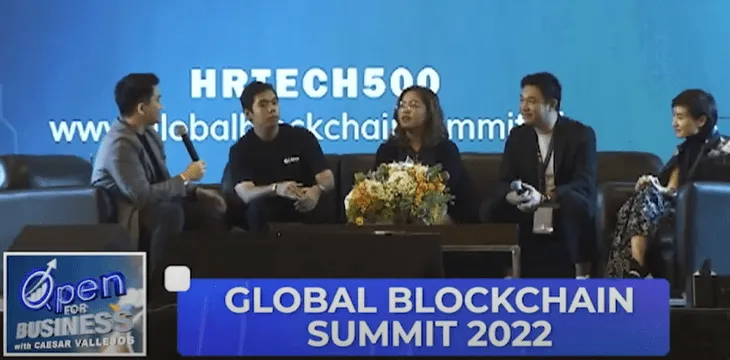|
Getting your Trinity Audio player ready...
|
The inaugural Global Blockchain Summit in Bataan was a big success, drawing thousands of attendees and some key regulators, thought leaders, and innovators in the tech, finance, and blockchain industries. The Bitcoin SV (BSV) ecosystem was well represented by Brendan Lee, Gareth Roberts, Stefan Matthews, Nicholas King and others, and they all had one message–BSV can transform the Philippines.
Brendan Lee, the founder of Elas Digital, took to the stage on the second day of the event to deliver a keynote presentation on creating private, permissioned ledgers on the public blockchain.
In an interview on the sidelines of the event, Lee cautioned Filipinos against being scammed to invest in digital assets whose sole purpose is speculation.
“One of the key differences with Bitcoin SV is that we don’t tell people to buy our tokens. When we build projects, we provide the tokens needed as part of the service delivery model. I believe that cryptocurrency is a predatory investment marketplace that’s designed to take people’s money and funnel it into the pockets of people who bought crypto early,” he told local TV network Net25.
Filipinos should focus on blockchain utility instead, he stated. Blockchain can be integrated into any system to make it “faster, much more efficient, and much more transparent.”
Lee further debunked the myths around proof of work, a consensus mechanism whose (mis)use by BTC has made it the target of environmentalists and regulators. When implemented correctly, “PoW is a very efficient system that doesn’t consume that much energy at all,” he noted.
Digital peso on BSV?
nChain has continued working with several central banks to explore central bank digital currency (CBDC) deployment on the Bitcoin blockchain. nChain’s Product Manager Gareth Roberts was at the Summit to deliver a keynote address on the blockchain’s role in the world of CBDCs.
Also speaking to Net25, Roberts revealed that nChain has built a solution that allows individual systems to have custody of their own tokens. While users can choose to transfer these tokens to their bank accounts, they must first have the ability to hold them in their wallets. This eliminates one of the key points of failure in CBDC designs–the need for a bank account.
nChain is also working on enabling zero-fee transactions for CBDCs, especially for smaller transactions. These, according to Roberts, would be covered in the central banking system.
“Our belief is that blockchain is the best distributed ledger technology. Blockchain has not been hacked in the true implementation it was conceived of in the whitepaper. We see blockchain as enabling CBDCs, as foundational to CBDCs. We see CBDCs being built on the most secure DLT–blockchain and Bitcoin,” he told the outlet.
Stefan Matthews was at the event as well, and as the Bitcoin veteran revealed, the Philippines is the ideal country for blockchain adoption. Matthews, who is the nChain and TAAL Chairman, has resided in the Philippines for over a decade now and has seen the country’s blockchain industry develop into the global leader it is today.
“For this country, with the number of overseas workers that we have, and the number of unbanked that we have, the application of blockchain for financial services is enormous. The application of blockchain for governance is enormous too. These are the two areas that I’ll be focusing my attention on,” Matthews stated.
For Nicholas King, the nChain country manager for the Philippines, the Southeast Asian country’s large population, which is quite young, is its biggest asset.
“They are first to adopt any new technology. You look back on the cell phones, they were adopted here quickly. Cryptocurrencies have been adopted here quite quickly as well, and as the blockchain technology continues to emerge, I’m sure it will be very widely embraced in this country as well.”
To learn more about central bank digital currencies and some of the design decisions that need to be considered when creating and launching it, you are going to want to read nChains CBDC playbook.
Watch: nChain’s Nicholas King on CoinGeek Backstage: Blockchain tech will drive Philippines digital economy

 07-09-2025
07-09-2025 





